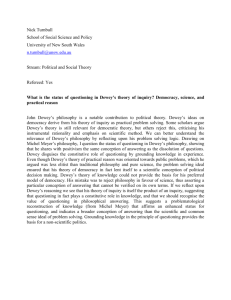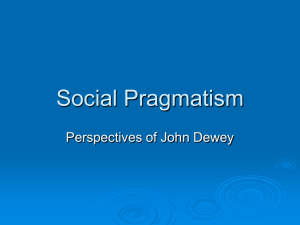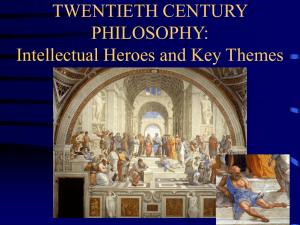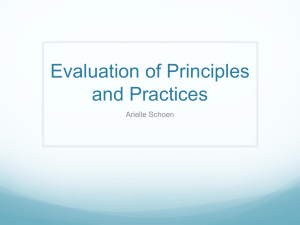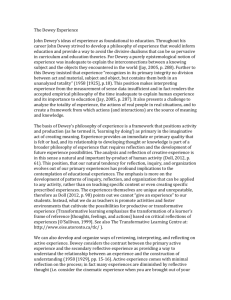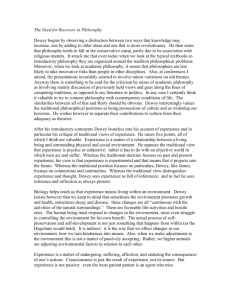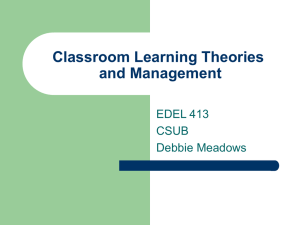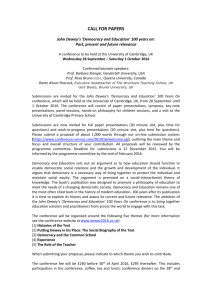Studies in Religion, Ethics and Politics: Classical and Contemporary
advertisement
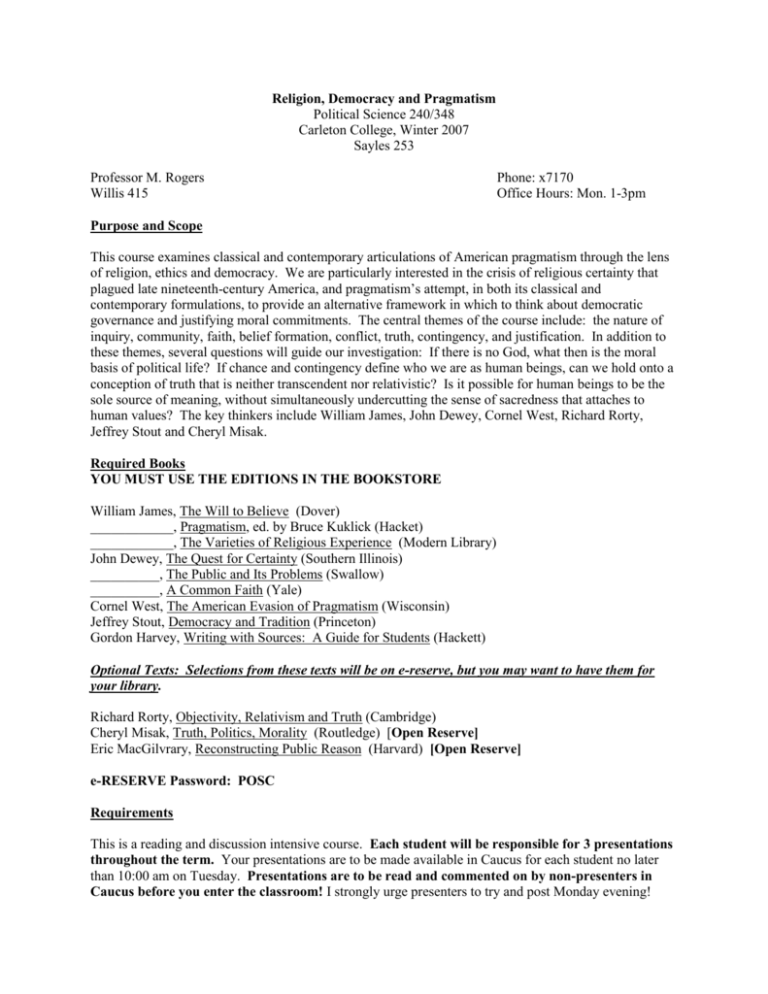
Religion, Democracy and Pragmatism Political Science 240/348 Carleton College, Winter 2007 Sayles 253 Professor M. Rogers Willis 415 Phone: x7170 Office Hours: Mon. 1-3pm Purpose and Scope This course examines classical and contemporary articulations of American pragmatism through the lens of religion, ethics and democracy. We are particularly interested in the crisis of religious certainty that plagued late nineteenth-century America, and pragmatism’s attempt, in both its classical and contemporary formulations, to provide an alternative framework in which to think about democratic governance and justifying moral commitments. The central themes of the course include: the nature of inquiry, community, faith, belief formation, conflict, truth, contingency, and justification. In addition to these themes, several questions will guide our investigation: If there is no God, what then is the moral basis of political life? If chance and contingency define who we are as human beings, can we hold onto a conception of truth that is neither transcendent nor relativistic? Is it possible for human beings to be the sole source of meaning, without simultaneously undercutting the sense of sacredness that attaches to human values? The key thinkers include William James, John Dewey, Cornel West, Richard Rorty, Jeffrey Stout and Cheryl Misak. Required Books YOU MUST USE THE EDITIONS IN THE BOOKSTORE William James, The Will to Believe (Dover) ____________, Pragmatism, ed. by Bruce Kuklick (Hacket) ____________, The Varieties of Religious Experience (Modern Library) John Dewey, The Quest for Certainty (Southern Illinois) __________, The Public and Its Problems (Swallow) __________, A Common Faith (Yale) Cornel West, The American Evasion of Pragmatism (Wisconsin) Jeffrey Stout, Democracy and Tradition (Princeton) Gordon Harvey, Writing with Sources: A Guide for Students (Hackett) Optional Texts: Selections from these texts will be on e-reserve, but you may want to have them for your library. Richard Rorty, Objectivity, Relativism and Truth (Cambridge) Cheryl Misak, Truth, Politics, Morality (Routledge) [Open Reserve] Eric MacGilvrary, Reconstructing Public Reason (Harvard) [Open Reserve] e-RESERVE Password: POSC Requirements This is a reading and discussion intensive course. Each student will be responsible for 3 presentations throughout the term. Your presentations are to be made available in Caucus for each student no later than 10:00 am on Tuesday. Presentations are to be read and commented on by non-presenters in Caucus before you enter the classroom! I strongly urge presenters to try and post Monday evening! This approach is based on three considerations. First, philosophers can be notoriously difficult to understand and comprehend. As we read, we need a running list of places of ambiguity, insights, and clues to what the author is attempting to say. Each text is an answer to questions and concerns of the highest order. As such, this running list is an attempt to figure out those questions, the answers, and assess the worth of both. Posting is an opportunity for you to do this and for us to figure out as a group what the texts are about. Second, the postings become cumulative wisdom that you can draw from as your write you papers. There will be markers in your postings to pages, passages, and links among pages that become a short-handed way for you to think through the text in a short amount of time without reading it again. (All of these texts, however, should be read again at some point.) Third, posting provides us with the opportunity to make our discussion dynamic and exciting. Nothing is more depressing then trying to figure out for the first hour of the class what you want to ask of each other and the text. So the postings will have generated a common point from which we can move. The breakdown of requirements is differentiated according to whether you registered for 240 or 348: Requirements for 240 CLASS PARTICIPATION, PRESENTATIONS AND POSTINGS 40% THREE ESSAYS ON A TOPIC OF YOUR OWN CHOOSING IN CONSULTATION WITH ME: 4-6 Pages (20% EACH) 60% Requirements for 348 PAPER PROPOSAL (3-5 PAGES) 10% CLASS PARTICIPATION, PRESENTATIONS AND POSTINGS 40% FINAL PAPER (12-15 PAGES) 50% Reading and Assignment Schedule 1. The Historical and Philosophical Backdrop Th 1/4/07 Introductory Session: Pragmatism’s Modernity T. J. Jackson Lears: No Place of Grace, Ch. 1 [e-reserve] George Cotkin: Reluctant Modernism, Ch. 1 [e-reserve] T 1/9/07 C. S. Peirce, “The Fixation of Belief” (1877), “How to Make Our Ideas Clear” (1878) [ereserve] These readings are not required, but would be helpful as we move forward: Robert Westbrook, John Dewey and American Democracy 1-59 [e-reserve] Paul Jerome Croce, Science and Religion in the Era of William James, Intro, chap. 2 [ereserve] 2. Classical Formulations: Religion, Democracy and Pragmatism William James (1842-1910) Th 1/11/07 The Will to Believe (1897), chaps. 1-2 Very helpful piece if you can get to it: Eric MacGilvray, “Prospectivism and ‘The Will to Believe’” [e-reserve] T 1/16/07 The Will to Believe, chaps, 3, 6; Pragmatism (1907), Lectures I-II Th. 1/18/07 Pragmatism, Lectures VI-VIII FRIDAY 1/19/07 PAPER 1 T 1/23/07 Varieties (1902), Lectures I-II, IV-V Th 1/25/07 Varieties, Lectures, VI-VIII, XVIII John Dewey (1859-1952) T 1/30/07 “The Influence of Darwin on Philosophy” (1910) [e-reserve]; “Existence as Precarious and as Stable,” in Experience and Nature (1925) [e-reserve]; Quest for Certainty (1929), Chaps. 1-2 Th 2/1/07 Quest for Certainty, chaps. 3-4 T 2/6/07 Quest for Certainty, chaps, 5-6, 8, 10 Th 2/8/07 Quest for Certainty, chaps. 11; “Existence, Value and Criticism,” in Experience and Nature [e-reserve] Helpful pieces if you can get to them: Hilary Putnam, “The Three Enlightenments”; Robert Brandom, “The Pragmatist Enlightenment (and its Problematic Semantics),” section I; Melvin L. Rogers, “Action and Inquiry in Dewey’s Philosophy” [all on e-reserve] T 2/13/07 A Common Faith (1934) (entirety); Melvin L. Rogers, “Faith and Democratic Piety,” [e-reserve] WENDESDAY 2/14/07 PROPOSAL DUE BY 5 P.M Other essays by Dewey worth considering if you explore the topic of religion: “The Value of Historical Christianity” (1889) “Christianity and Democracy” (1892) “Reconstruction” (1894) “Beliefs and Existence” (1905) “Religion and Our Schools” (1908) “Nature and Its Good: A Conversation” (1910) [all on e-reserve] Th 2/15/07 NO CLASS FRIDAY 2/16/07 PAPER 2 T 2/20/07 Public and Its Problems (1927), Forword-V Th 2/22/07 Public and Its Problems, VI-Afterword 3. Contemporary Formulations: Religion, Democracy and Pragmatism T 2/27/07 Cornel West, American Evasion, chaps 1-3; Jeffrey Stout, Democracy and Tradition, chap. 1 Th 3/1/07 Richard Rorty, “Pragmatism without Method” “Pragmatism as Romantic Polytheism” “Religious Faith, Intellectual Responsibility, and Romance” “The Priority of Democracy to Philosophy” [all on e-reserve] T 3/6/07 West, American Evasion, chap. 6 Stout, Democracy and Tradition, chaps. 3 Cheryl Misak, “Truth, Inquiry, and Experience: A Pragmatist Epistemology,” [ereserve] TH 3/9/07 Stout, Democracy and Tradition, chaps. 9 and 12 TUESDAY 3/14/07 FINAL PAPER AND PAPER 3 DUE BY 5 P.M Disability Accommodations and Academic Honesty Any student who feels he or she may need an accommodation based on the impact of a disability should contact me privately to discuss specific needs. Please contact the Office of Disability Services for Students in the Wellness Center (x4464) to coordinate reasonable accommodations. “At Carleton College, an act of academic dishonesty is regarded as conflicting with the work and purpose of the entire College and not merely as a private matter between the student and an instructor; all cases involving such dishonesty are referred to the Academic Standing committee for appropriate action. This action can vary from a grade of Unsatisfactory in the given piece of work to a recommendation of permanent dismissal from the College in cases of repeated or serious offenses” (http://apps.carleton.edu/campus/doc/honesty/). Students are expected to be familiar with this statement and all related policies related to academic honesty at Carleton. Pragmatism Course Addendum Note: The books marked with an “” are on open reserve at the library. Relevant Works of Intellectual History (Small Selection) *Deneen, Patrick Democratic Faith Princeton, NJ: Princeton University Press, 2005. Associate Professor of Government at Georgetown University. He charts the intellectual and philosophical history of “democratic faith” in America, linking it to the pragmatists, especially James and Dewey. Faith turns out to equal optimism, which, for Deneen, results in intense forms of disappointment. He argues for his alternative view of democratic realism. *Diggins, John Patrick. The Promise of Pragmatism. Chicago: University of California Press, 1994. Professor of History at Graduate Center of City University of New York. Argues that modernity leaves us bereft of meaning and pragmatism in both its classical and contemporary form is unable to respond. *Hovenkamp, Herbert. Science and Religion in America, 1800-1860. Philadelphia: University of Pennsylvania, 1979. Professor of Law at Iowa Law School. Explores the response by philosophers and theologians to science during the periods identified. Part I, the most helpful part of the book, shows the attempt by Protestants to reconfigure their religious commitments to include scientific advances. Helpful because it provides an argument for how science was able to live comfortably with religion before Darwin. *Kloppenberg, James. Uncertain Victory: Social Democracy and Progressivism, 1870-1920. New York: Oxford University Press, 1988. Professor History at Harvard. He provides an account of the transAtlantic conversation among thinkers attempting to address the crisis of meaning and religious certainty. The epistemological arguments made by James and Dewey (from the American side) are then put to work in their visions of democracy. All of these thinkers are seen as standing in between a willful individualism and a crass communitarianism. Pay close attention to his careful understanding of progress throughout this book. *Lears, T. J., Jackson. No Place of Grace: Antimodernism and the Transformation of American Culture, 1880-1920. Chicago: 1983. Professor of History at Rutgers. Another historian responding to the crisis of meaning and religious certainty brought about because of science and the rise of individualism specifically, but rationalism (a la Weber) more generally . He examines the alternative quests, the turn to pre-modern notions of art on the one hand, and a vision of experience as imbued with meaning on the other, for authentic experiences that would simultaneously provide a sense of moral guidance. He argues that both approaches failed. *Menand, Louis. The Metaphysical Club: A Story of Ideas In America. New York: Farrar, Straus, Giroux, 2001. Professor of History of American Civilization at Harvard. This book, which won the Pulitzer, traces the emergence of pragmatism in the wake of the Civil War. The book has a good discussion of Darwin, James and Dewey. Nice Read. Meyer, D. H. “American Intellectuals and the Victorian Crisis of Faith.” Victorian America. Edited by Daniel Walter Howe. Philadelphia: University of Pennsylvania Press: 1976, 59-77, also in American Quarterly, 27 (1975): 585-603. The essay examines the distinctive response by Americans (as oppose to the Europeans) to the crisis of religious faith. Meyer’s is particularly interested in the middle ground American intellectuals sought to occupy between “agnosticism and positivism, at one extreme, and simple, uncritical faith, at the other,” and their specific spiritual concerns. This is a very helpful and nice essay! Works on James and/or Dewey (Small Selection) *Campbell, James. Understanding John Dewey: Nature and Cooperative Intelligence. Chicago: Open Court, 1995. Professor of Philosophy at University of Toronto. This is an Intellectual biography of Dewey’s moral and political philosophy. This is far more systematic treatment than Westbrook’s account. Especially useful is the importance of Darwin to Dewey’s philosophy. *Caspary, William R. Dewey on Democracy. New York: Cornell University Press. 2000. Professor Emeritus of Political Science, Washington University. Caspary shows that conflict resolution is central to Dewey’s account of inquiry and therefore fundamental to his moral and democratic theory. The book is filled with good—real world—issues to which he applies Dewey’s thoughts. *Festenstein, Matthew. Pragmatism and Political Theory: From Dewey to Rorty. Chicago: University of Chicago Press, 1997. Reader in the department of Politics at University of Sheffeld. The first half of this book is a critical interpretation of Dewey’s moral and political philosophy, while the second half of the book engages contemporary thinkers such Jurgen Habermas, Putnam and Rorty, showing how Dewey’s philosophy has been shaped in very different ways. The fundamental contribution of this book, I think, is showing the relevance of Dewey and the uses to which he has been put. Honneth, Axel. “Democracy as Reflexive Cooperation: John Dewey and the Theory of Democracy Today.” Political Theory. 26.6 (1998): 163-83. Professor at the Institute for Social Research in Frankfurt, Germany. Explores Dewey’s democratic theory against the backdrop of Jurgen Habermas and Hannah Arendt. *Levinson, Henry. The Religious Investigations of William James. Chapel Hill, NC: University of North Carolina Press, 1981. Professor of Religion at University of North Carolina Greensboro. Exploration and investigation of James’ attempt to vindicate religious belief. *Miller, Joshua. Democratic Temperament: The Legacy of William James. Lawrence, KS: University Press of Kansas, 1997. Professor of Lafayette College. An attempt to show the importance of politics to James’ philosophy—a philosophy often seen as being primarily interested in the individual. Martin, Jay. The Education of John Dewey: A Biography. New York: Columbia University Press, 2002. Professor of the Humanities at Claremont McKenna College. Nice compliment to Westbrook’s intellectual biography. Myers, Gerald. William James: His Life and Thought. Yale University Press, 2001. Professor Emeritus of Philosophy, Queens College, NYC. Critical biography of William James. *Rockefeller, Steven C. John Dewey: Religious Faith and Democratic Humanism. New York: Columbia University Press, 1991. Professor Emeritus of Religion, Middlebury College. He argues for the importance and centrality of religion to Dewey’s ethical and political philosophy. I think the book is too much of an intellectual biography and not enough of a systematic defense of the importance of religion to Dewey’s philosophy. Other Works Worth Considering Bernstein, Richard. Praxis and Action: Contemporary Philosophies of Human Activity. Philadelphia: University of Pennsylvania Press, 1971. Professor of Philosophy, New School for Social Research. ________. Beyond Objectivism and Relativism: Science, Hermeneutics, and Praxis. Philadelphia: University of Pennsylvania Press, 1983. ________. Philosophical Profiles: Essays in a Pragmatic Mode. Philadelphia: University of Pennsylvania Press, 1986. Dickstein, Morris. (Ed.) The Revival of Pragmatism: New Essays on Social Thought, Law, and Culture. Durham: Duke University Press, 1998. Professor of English Queens College. Joas, Hans. The Creativity of Action. Chicago: University of Chicago Press, 1996. Professor University of Berlin/University of Chicago. ________. The Genesis of Values. Translated by Gregory Moore. Chicago: University of Chicago Press, 2000. Putnam, Hilary. “Reconsidering Deweyan Democracy.” Pragmatism in Law and Society. Edited by M. Brint and W. Weaver. Boulder, CO: Westview Press, 1991, 217-47. Professor of Philosophy Emeritus Harvard University. ________. Pragmatism: An Open Question. Oxford, UK: Blackwell Press, 1995. Rorty, Richard. Philosophy and the Mirror of Nature Oxford, UK: Blackwell, 1980. Professor of Emeritus of Comparative Literature and, by courtesy, of Philosophy at Stanford University ________. Contingency, Irony and Solidarity. New York: Cambridge, 1989

